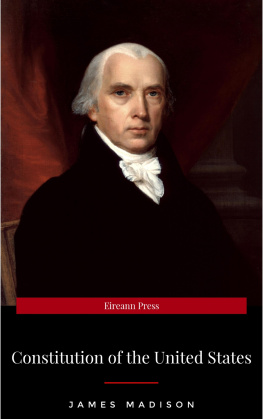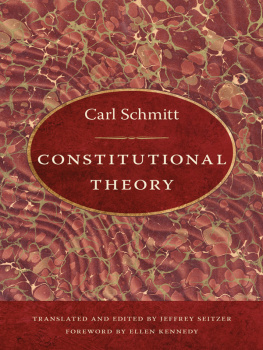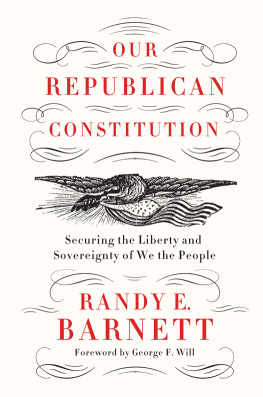The Cosmopolitan Constitution
Alexander Somek
OXFORD CONSTITUTIONAL THEORY
Series Editors:
Martin Loughlin, John P. McCormick, and Neil Walker
(p.ii) OXFORD CONSTITUTIONAL THEORY
Series Editors:
Martin Loughlin, John P. McCormick, and Neil Walker
Oxford Constitutional Theory has rapidly established itself as the primary point of reference for theoretical reflections on the growing interest in constitutions and constitutional law in domestic, regional and global contexts. The majority of the works published in the series are monographs that advance new understandings of their subject. But the series aims to provide a forum for further innovation in the field by also including well-conceived edited collections that bring a variety of perspectives and disciplinary approaches to bear on specific themes in constitutional thought and by publishing English translations of leading monographs in constitutional theory that have originally been written in languages other than English.
ALSO AVAILABLE IN THE SERIES
The Twilight of Constitutionalism?
Edited by Petra Dobner and Martin Loughlin
Beyond Constitutionalism
The Pluralist Structure of Postnational Law
Nico Krisch
The Constitutional State
N. W. Barber
Sovereigntys Promise
The State as Fiduciary Evan Fox-Decent
Constitutional Fragments
Societal Constitutionalism and Globalization
Gunther Teubner
Constitutional Referendums
The Theory and Practice of Republican Deliberation
Stephen Tierney
Constituting Economic and Social Rights
Katharine G. Young
The Global Model of Constitutional Rights
Kai Mller
The Three Branches
A Comparative Model of Separation of Powers
Christoph Mllers
After Public Law
Edited by Cormac Mac Amhlaigh, Claudio Michelon, and Neil Walker
The Cosmopolitan State
H. Patrick Glenn
Fault Lines of Globalization
Legal Order and the Politics of A-Legality
Hans Lindahl
Constitutional Courts and Deliberation Democracy
Conrado Hbner Mendes
The Structure of Pluralism
On the Authority of Associations
Vctor M. Muiz-Fraticelli
- Great Clarendon Street, Oxford, OX2 6DP,
- United Kingdom
- Oxford University Press is a department of the University of Oxford.
- It furthers the Universitys objective of excellence in research, scholarship,
- and education by publishing worldwide. Oxford is a registered trade mark of
- Oxford University Press in the UK and in certain other countries
- The moral rights of the author have been asserted
- First Edition published in 2014
- All rights reserved. No part of this publication may be reproduced, stored in
- a retrieval system, or transmitted, in any form or by any means, without the
- prior permission in writing of Oxford University Press, or as expressly permitted
- by law, by licence or under terms agreed with the appropriate reprographics
- rights organization. Enquiries concerning reproduction outside the scope of the
- above should be sent to the Rights Department, Oxford University Press, at the
- address above
- You must not circulate this work in any other form
- and you must impose this same condition on any acquirer
- Crown copyright material is reproduced under Class Licence
- Number C01P0000148 with the permission of OPSI
- and the Queens Printer for Scotland
- Published in the United States of America by Oxford University Press
- 198 Madison Avenue, New York, NY 10016, United States of America
- British Library Cataloguing in Publication Data
- Data available
- Library of Congress Control Number: 2014934944
- Printed and bound by
- CPI Group (UK) Ltd, Croydon, CR0 4YY
- Links to third party websites are provided by Oxford in good faith and
- for information only. Oxford disclaims any responsibility for the materials
- contained in any third party website referenced in this work.
Dedication
(p.v) For George and Paul Horacek (p.vi)
(p.vii) Preface
This is a book on constitutionalism. It explores its rise and transformation up to the point at which it becomes suddenly confronted with its potential demise. Mainstream discourse notoriously ignores this dialectical turn. It is blinded by the belief that the one remaining obstacle to human progress is the nation state. This book, by contrast, offers a cautionary tale. Against the strong current of contemporary scholarship that celebrates the consummation of constitutionalism at a global scale, the book reckons with the twilight of idols. Greater constitutionalization of supranational or even international law threatens to rob constitutionalism of its political core. This can only be avoided by conceiving of the cosmopolitan constitution as a national constitution that submits its operation to the supervision of international peer institutions.
Three distinguished institutions made the work on this book possible: the University of Iowa College of Law, the Berlin Institute for Advanced Studies, and Princeton University.
I am the lucky beneficiary of the veritable dream team providing stewardship for my home institution: Dean Gail Agrawal, whose energy and charisma are unmatched, and Associate Deans Eric Andersen and Todd Pettys, whose dedication to their community is very humbling for ordinary citizens like me. Had it not been for their unflagging support, I would have never been able to finish this book.
During the academic year of 200708 the Berlin Institute for Advanced Studies provided me with a perfect research environment by awarding me a fellowship. It allowed me to participate in a focus group on the constitution beyond the nation state. With gratitude I remember the countless conversations I had with the other members of this group: Petra Dobner, Dieter Grimm, Bogdan Iancu, Martin Loughlin, Fritz Scharpf, Gunther Teubner, and Rainer Wahl. We met at least once a week in order to give each other a really hard time: No pain, no gain. Giving each other a hard time is also what Mattias Kumm and I were frequently up to whenever we met in Berlins Caf Einstein during that year.
While the experience in Berlin helped me to recalibrate my project, a fellowship in the Law and Public Policy Program of Princeton University (201213) finally allowed me to write everything down. Indeed, teaching a Freshman Seminar at Princeton in the fall of 2012 reassured me of the soundness of the overall conception. Two of my students, Oren Fliegelman and Martin Page, subsequently became my research assistants and helped me with the sources for Chapter One. Luckily, Martin Loughlin turned out to be one of my fellow fellows again. It may well be that out of fear of his stern supervision I was able to finish the book rather quickly. (p.viii)
The Law and Public Policy Program is rightly reputed to be a true intellectual power house. It would not be what it is if it were not for the leadership provided by Kim Scheppele and Leslie Gerwin and the dedicated work by Judi Rifkin and Jennifer Bolton. While I was at Princeton, other people joined me in thinking about constitutional issues, among them, in particular, Christopher Eisgruber, Antonio Estella de Noriega, William Ewald, Lisa Miller, Mirjam Knkler, Jan-Werner Mller, and Yaniv Roznai.








